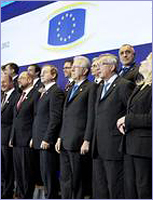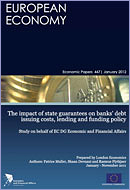 |
 |
|
|
|
|
 |
 |
 |
 |
EU leaders conclude fiscal compact and European Stability Mechanism, agree on “growth-friendly consolidation” and “job-friendly growth”
At the informal European Council meeting on 30 January, EU leaders emphasised the importance of growth and jobs, and not only fiscal consolidation, in tackling the economic and financial crisis. In their official statement, the leaders said that “Growth and employment will only resume if we pursue a consistent and broad-based approach, combining a smart fiscal consolidation preserving investment in future growth, sound macroeconomic policies and an active employment strategy preserving social cohesion.” Their three-point plan focuses on stimulating employment, especially for young people, completing the Single Market and boosting the financing of the economy, in particular SMEs. Conclusion of the treaties establishing the fiscal compact and European Stability Mechanism is expected to give further impetus to fiscal consolidation, growth and employment.
|
 |
 |

[Fiscal consolidation] must be smart: countries which cut in the very areas they need to nurture for future growth will pay a heavy price down the line. This is not a choice between fiscal consolidation and growth. We need both!
José Manuel Barroso, President of the European Commission |
 |
 |
|
|
|
|
 |
|
 |
 |
 |
 |
 |
 |
EU leaders finalise fiscal compact in major step towards closer fiscal and economic integration and stronger governance
At their European Council meeting on 30 January, twenty-five of the EU's 27 Member States agreed to join the Treaty on stability, coordination and governance in the Economic and Monetary Union. Only the UK and the Czech Republic decided to stay outside the treaty, more commonly known as the fiscal compact. The international treaty aims to further strengthen fiscal discipline and will require countries balance their budgets in structural terms or to have a surplus. Countries are to take action if their public deficits exceed the agreed limit of 0.5% of GDP. Exceptionally, this limit could rise to 1.0% of GDP if government debt is significantly below 60% and if there is a low risk to debt sustainability. The balanced budget rule would be written into each country's laws, preferably its constitution. An arrangement will be decided upon regarding the procedure to bring to the Court of Justice in cases of non-compliance with the requirement to incorporate the balanced budget rule into national laws. The treaty will be signed at the next summit meeting on 1 March and is scheduled to come into force on 1 January 2013 provided it has been ratified by at least 12 Member States.
|
 |
|
 |
 |
 |
|
 |
 |
 |
 |
 |
 |
European Stability Mechanism treaty ready for signature, may enter into force as early as July 2012
During the informal European Council meeting on 30 January, EU Heads of State or Government finalised the Treaty establishing the European Stability Mechanism (ESM). The treaty is now ready for signature with the objective that it enters into force in July 2012. The ESM will, as a permanent mechanism, contribute to raising confidence, solidarity and financial stability in the euro area. It will have a wide range of tools available and a strong financial basis. As currently foreseen, the European Financial Stability Facility (EFSF) and the ESM will have a combined effective lending capacity of EUR 500 billion. However, EU leaders will in March this year reassess the adequacy of these combined resources prior to the entry into force of the ESM.
|
 |
|
 |
 |
 |
|
 |
 |
 |
 |
 |
 |
Barroso and Rehn reaffirm European response to the crisis at World Economic Forum in Davos
During the World Economic Forum in Davos, Switzerland from 25-29 January, Commission President José Manuel Barroso said that his top priority was to restore growth in Europe. To re-ignite growth, Barroso underscored the importance of rejuvenating the Lisbon Agenda, and he promised to refocus the agenda on a limited number of areas. During a panel discussion on the future of the euro area, Olli Rehn, European Commission Vice-President and Commissioner for Economic and Monetary Affairs and the Euro, said that fiscal consolidation was necessary because the crisis is essentially a crisis of confidence. “In the new structure, prevention is the name of the game,” said Rehn. He also emphasized the importance of growth and employment, however. “We have, in fact, a wave of reforms going on in Europe,” Rehn asserted.
|
 |
|
 |
 |
 |
|
 |
 |
 |
 |
 |
 |
G20 Deputies gear up for Ministerial meeting in February
G20 Deputies met in Mexico on 19-20 January to prepare the G20 Finance Ministerial meeting on 25-26 February. They discussed current risks to the global economic outlook, including the sovereign debt crisis, progress made on the G20 Cannes Action Plan for Growth, and reforms of the International Financial Architecture, in particular plans to increase the resources of the IMF. G20 Deputies also discussed the state of play of financial market reform and the work programme of the Financial Stability Board (FSB) for 2012, and how to structure G20 work on energy and commodity markets.
|
 |
|
 |
 |
 |
|
 |
 |
 |
 |
 |
 |
January 2012: Economic sentiment increases in both the EU and the euro area
In January, the Economic Sentiment Indicator (ESI) rose by 1.2 points in the EU and by 0.6 points in the euro area, to 92.8 and 93.4, respectively - the first pick-up in sentiment since March 2011. The improvement was mainly driven by increasing confidence in the services sector and – to a lesser extent – among consumers and in the construction sector. Confidence in industry improved only marginally in the EU (+0.4), staying just below its long-term average, while it remained unchanged in the euro area. Among the largest euro-area Member States, sentiment improved in Germany (+2.3) and Spain (+1.8), while it deteriorated in France (-2.1), Italy (-1.1) and the Netherlands (-1.0). In large Member States in the rest of the EU, sentiment increased in both the UK (+5.0) and Poland (+2.7). Despite the improvements, the ESI is above its long-term average only in Germany.
|
 |
|
 |
 |
 |
|
 |
 |
 |
 |
 |
 |
Council agrees on draft Regulation for greater transparency and reduced risk in derivatives markets
On 24 January, the European Council approved a draft Regulation that would increase the transparency of derivatives and reduce risk in the over-the-counter (i.e. privately negotiated, OTC) derivativesmarket. The draft regulation calls for the clearing of standardised OTC derivative contracts through central counterparties, in order to reduce counterparty risk (i.e. the risk of default by one party to the contract), and the reporting of all derivative contracts to trade repositories (i.e. central data centres), thereby offering market participants a clearer view of the derivatives market. The Council adjusted its position in order to facilitate rapid agreement with the Parliament, and adoption of the Regulation on first reading. The main change would strengthen the role of the college of supervisors and the European Securities and Markets Authority (ESMA).
|
 |
|
 |
 |
 |
|
 |
 |
|
 |
 |
 |
 |
 
|
 |
The impact of state guarantees on banks’ debt issuing costs, lending and funding policy
This paper presents an analysis carried out by London Economics on behalf of DG ECFIN. The empirical study examines the effectiveness of state guarantees provided to banks in 2008-10. It analyses the market value of state guarantees as reflected in banks’ issuing costs and whether there were significant differences visible in the balance sheets of banks that used state guarantees versus those that refrained from using them. The results of the empirical research suggest that the guarantee schemes were successful in lowering the costs of bond issuance of participating banks (by 30 basis points) while having relatively little distortionary impact on non-participating banks. Moreover, cross-border spill-overs appear to be non-existent.
|
| |
 |
|
 |
 |
|
 |
 |
 |
|
 |
 |
 |
|
 |
 |
 |
|
 |
 |
Directorate-General for Economic and Financial Affairs |
|
|
|
 |
|